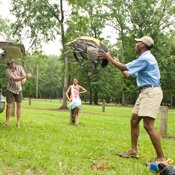The key to a pleasant camping trip is packing well. Here is a list of the most essential items. Before you go, visit a camping Web site such as http://www.campingpacklist.com for a complete checklist.
• Bright, weather-appropriate clothing: Check the weather forecast before you go and pack clothes that will keep you comfortable. Even in the summer, it may get cold in the woods at night. Wear bright clothing to distinguish yourself from prey (whether for animals or hunters). You'll also be easy to spot if you get lost. Consider waterproof hiking boots, or sandals for lighter hikes.
• Heavy-duty garbage bags: One of the most commonly forgotten items. Use a garbage bag to make sure you leave no trace in nature, protect your gear, wear as an emergency poncho or hang from a tree as a makeshift tent.
• Heavy-duty aluminum foil: Lightweight and versatile, you can use aluminum foil to form a container for boiling water and cooking food, line your portable grill or use as a signal mirror in case of emergency.
• Tarp: Use tarps to cover the ground or your tent floor, and as a shield for wind or sun. In an emergency, use the tarp as shelter.
• Rain fly for tent: Essential for staying warm and dry in inclement weather.
• Insect repellent and citronella candle: Keep mosquitoes away, especially between dusk and dawn, by lighting a citrus candle at the campsite and spraying yourself with insect repellent. The most effective version contains toxic DEET, but if you're pesticide averse, try homemade formulas of catnip oil and grain alcohol, or rub your skin with Thai lemongrass.
• Compass and map: Get to know your hiking course before you leave.
• Paper products: You'll be glad to have extra toilet paper and paper towels on hand.
• Hand sanitizer or wipes: Keep your hands clean, especially before preparing food or eating.
• Lighter or matches in waterproof box: It is very difficult to start a fire the Neanderthal way, so bring plenty of strike-anywhere matches and keep them in a box with a water-tight seal. Lighters also work in any weather.
• Water bottle: Carry one at all times so you stay hydrated.
• Water purification tablets: Even clear water outdoors can contain Giardia or other microorganisms. Treat or boil all your water.
• Flashlight: Compact flashlights can be powerful when used to light the way for night hikes or camp chores, as well as for signaling. "The Pocket Outdoor Survival Guide" recommends the Streamlight Twin-Task or Sure-Fire E2 Executive. Consider flashlights with a 10-year Lithium battery, or those powered by hand crank, shaking or solar energy.
• Sunscreen: Buy a 30 SPF sunscreen that protects against UVA and UVB rays. 30 SPF blocks 96.7 percent of rays, while SPF 50 blocks 98 percent. The negligible difference is probably not worth putting extra chemicals onto your skin. Reapply every two hours.
• Bandana: Use it as a head covering, dish cloth, hankie or tourniquet. Wet it and tie it around your neck to cool off. Cover your pillow with it, or sit on it. Find your own creative uses.
• Swiss Army knife or Leatherman. Make sure it's clean and sharp. You'll find its tools, such as the tweezers and the can and bottle opener, useful.
• Emergency whistle: One of the cheapest and most important items you'll pack. Buy one that's extremely loud. Some models come with other features, such as a compass, signal mirror and waterproof matchbox.
Other essential items to pack:
First aid kit, stocked
Towels
Extra socks
Hat
Prescription medicines
Toiletries
Bedding
Tent and stakes
Bungee cord
Sleeping bag and pillow
Cooking supplies/mess kit
Extra batteries for any appliance that requires them



Comments
Use the comment form below to begin a discussion about this content.
comments powered by Disqus